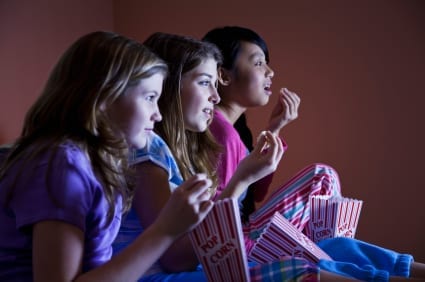 Every parenting self-help primer seems to stress how important the ages 0 to 5 are for children’s development.
Every parenting self-help primer seems to stress how important the ages 0 to 5 are for children’s development.
Now that I’m parenting teenagers, I wonder. There is no denying that the years 12 to 17 are even more formative. Of course, in different ways. But my kids are going to remember this time period far better than 0 to 5 (of which they have only a few fuzzy memories).
To my surprise, I’m finding that “screen time” — that evil scourge that warps kids’ brains – is actually my ally here.
There is very little my teenagers want to do with me, except for me driving them places and giving them wads of cash as they get out of the car.
But they will watch television and movies with me. In fact, they want to.
In the past year, we’ve watched an astonishing combination of low-brow and high-brow screen entertainment. We’ve had fun. I like to think I’ve taught my kids a few important life lessons, using television to make the medicine go down.
First came the Fox series Prison Break. The valedictorian from my high school class, who has a PhD in English from UC Berkeley, recommended it. So in good conscience, I asked my teenage son and his youngest sister to watch it with me.
It took a year, but we watched all 80 episodes together. I doubt the industry watchdog Common Sense Media would sanction my choice. The series profiles a group of men, including two brothers, who get into and out of several real, and a few psychological, prisons. The subjects covered are gruesome: prison rape, corrupt guards, botched escape attempts, the horrors of Panamanian prisons.
Not exactly Sesame Street.
But the three of us had incredibly rich discussions about the death penalty, the power of male friendship, the Machiavellian “ends justifies the means” debate. We researched American penal code and dug into the realities of South American prisons (which are, horrifyingly, worse than the series’ grisly depiction).
Over the past year, we also watched Downton Abbey, Brideshead Revisited, Star Wars, Avatar, Almost Famous, The Hangover, Something’s Gotta Give, and Little Miss Sunshine. I am not sure how else I could cover English prewar history, dysfunctional families, the 60s and 70s rock and roll culture, New York divorcees, Las Vegas bachelor parties and space travel as easily and enjoyably without these movies.
Then, the zenith: SuperBad. Now, it was predictable that my children would enjoy this juvenile, penis-obsessed, sex-obsessed, drinking and girl-obsessed chronicle of male adolescence, produced and directed by the king of commercial low-brow, Judd Apatow. But who would have predicted that moi, a 47-year-old Harvard educated mother of three, would finally, finally understand the male brain as a result?
Plus, we have never laughed so hard together. At this stage, that is far more important to my family than eating dinner together every night.
These days my 16-year-old son and I are deep into Homeland, the CIA spy series from Showtime featuring Claire Danes. Simply put, we are addicted. My son gets his homework done speedily, with no nagging, so we can watch episodes on weeknights. His grades have actually gone up thanks to Showtime.
Through Homeland, we’ve learned quite a bit about U.S. military intelligence and the troubles of the Mid-East. An added plus has been that the first season has a lot of sex, masturbation and female nudity. A few times I felt it polite to leave the room.
“Mom,” my son remarked after the last episode. “There were a lot of boobs in that one.”
Now, what else could I possibly do with my teenage boy that could lead into a comfortable, productive discussion of female mammary attributes?
Thank you, America’s filmmakers. I owe you one. This may be the only recognition your R rated movies and tv series get for helping raise educated, open-minded American citizens. But you deserve it.





